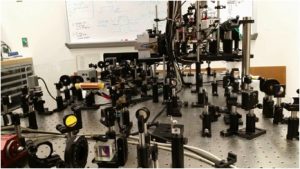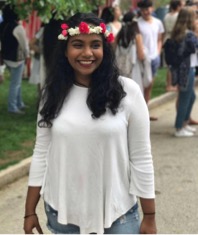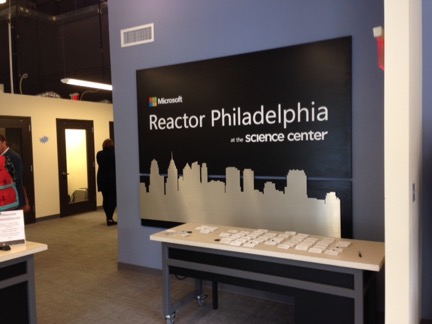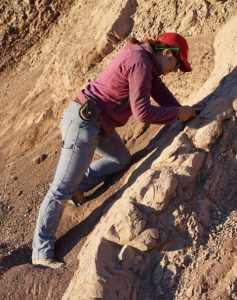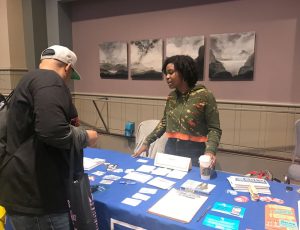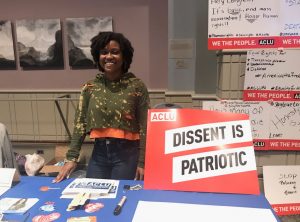Name: Danielle Xie

Extracting glucose from blood samples.
Class Year: 2019
Major: Biochemistry and Molecular Biology
Minor: Music
Hometown: San Diego, Calif.
Internship Placement: Children’s Hospital Colorado
Job Title: Summer Research Intern with Pediatric Endocrinology
Location: Aurora, Colo.

Putting organic lab skills to use with Dr. Melanie Cree Green ’99.
What’s happening at your internship?
I’ve been having a wonderful time here at CHC! This summer, I’m conducting translational research in the pediatric endocrinology department. I work closely with Dr. Melanie Cree Green ’99, whose research focuses on hepatic metabolism in adolescents with PCOS (polycystic ovarian syndrome).
There are so many various aspects to this internship:
Research: My research project involves investigating whether the standard 2-hr OGTT (oral glucose tolerance test) used to test for diabetes might have additional clinical applications in the PCOS setting. For example, whether the shape and/or timing of the glucose peak observed during this test might reflect certain physiology in these girls relating to hepatic function. We examine several metabolic markers (C-reactive protein for inflammation and the hormones adiponectin and glucagon-like peptide-1, etc.) as well as evaluate several mathematical models for assessing insulin secretion and sensitivity. By running statistical analyses on all these data, we can identify certain relationships and ultimately gain a better understanding of the physiology that causes altered metabolism in these girls.
I get to present the progress I’m making every week at lab meeting. Lab meeting is also a chance for me to learn about all the other research going on in the department.
Shadowing: The clinical aspect of this internship involves shadowing at the PCOS multidisciplinary clinic. Patients who come into the clinic for PCOS are seen by endocrinology, dermatology, gynecology, and psychology. Sometimes they are also seen by nutrition or exercise physiology, depending on their specific needs.
A video from the clinic: https://www.facebook.com/childrenshospitalcolorado/videos/10154697836376166/
Conferences and Lectures: Between Children’s Hospital and Anschutz Medical Campus (located right across from us), there are always great research talks going on. Additionally, I’ve enjoyed attending the weekly endocrine grand rounds, in which a specific patient case (problem, diagnosis, and treatment) is presented to an audience of doctors, medical students, residents, etc. The cases are always interesting, and it’s allowed me to glimpse critical thinking and clinical reasoning in action.
Research Study Visits: Currently we have two ongoing studies. Whenever we have a research patient scheduled, I try to tag along to observe how these studies are conducted. These days tend to be long, since we arrive early in the morning for the first blood draw. After the nurse draws the blood, we take it to the processing room to have it spun on the centrifuge, plasma extracted, then stored for analysis. In addition to the blood draws, there’s a lot else going on in the room: oxygen masks and metabolic carts, food frequency/mood questionnaires, collection of melatonin samples, etc.
Why did you apply for this internship?
I was first connected with Dr. Green through Bryn Mawr’s winter externship program. I applied because I had an inkling that I wanted to pursue an MD/PhD and eventually a career like hers, involving both research and clinical practice. I had a wonderful time, and I was thrilled to learn that I had gotten the funding to continue with her during the summer.
Can you talk about the skills you are learning and why they are important to you?
As I mentioned earlier, there are so many different aspects to this internship, and each experience offers something new. Throughout my time here, I’ve come to realize how important skills like writing, communication, collaboration, and critical thinking are in the medical and scientific fields.
Collaboration: Whether it’s a grant proposal, data results, a manuscript draft, or a patient diagnosis, ideas are always run by several people, sometimes across departments and fields. With the current data set I’m working on, it’s been so valuable to talk through the data/results with other team members; everyone brings unique perspectives to the table.
Communication: Through writing up an abstract and now drafting a manuscript, I’m really honing those writing skills. Additionally, I will be learning how to present research by preparing a 20-minute oral presentation on my project. This will be presented at lab meeting during my last week here.
Thinking outside the box: there’s a lot of trial and error involved in research. Data and results don’t always come out as expected; the relationships aren’t always straightforward. We’ve often had to reframe our hypothesis, or consider the data from a different perspective.
Living in a new city? What has that experience been like for you?
I take advantage of the amazing public transport system to explore the city on the weekends. There’s always lots to do here in Denver — from music festivals to hiking to good restaurants. I often meet some pretty cool strangers during these solo excursions!

